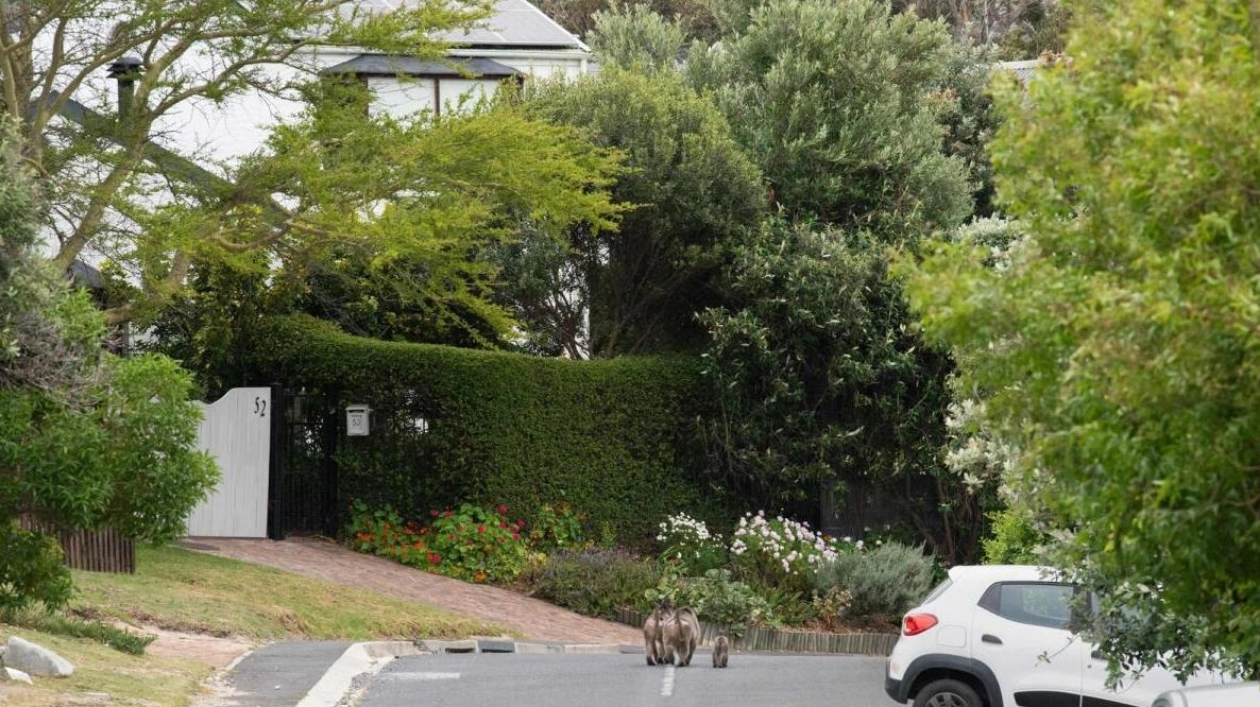A troop of Chacma baboons (Papio ursinus) navigates through the suburban landscape of Da Game Park, near Simon's Town outside Cape Town, on October 31, 2024. — AFP
On a bright afternoon in Cape Town's coastal village of Simon's Town, three adolescent chacma baboons create a stir, scaling rooftops, leaping between structures, and swinging from gutters. Enthralled tourists halt to capture the troop's road crossing on camera. Residents, however, are less enthused; this is an everyday occurrence in the picturesque village nestled between the Atlantic Ocean and Table Mountain National Park.
Approximately 500 chacma baboons—one of the largest monkey species, weighing up to 40 kilos (88 pounds)—roam the peninsula south of Cape Town, according to the South African National Biodiversity Institute. As human development encroaches upon their natural habitat, these animals increasingly venture into upscale properties to forage in gardens and rummage through bins. Some even manage to infiltrate homes, causing significant disruption.
Many locals harbor a fondness for these creatures, bestowing them with pet names and tracking their daily escapades on social media. Yet, others are growing increasingly exasperated. "They've become so brazen now. They're more domesticated than they should be," remarked Duncan Low, 60, who operates an ice cream shop. The intruders have even begun raiding kitchens and snatching food from plates in restaurants. "They're on a sugar and fast-food binge," Low added.
In 2021, the city euthanized a notorious alpha-male baboon who had terrorized residents through over 40 food-related raids, often entering homes while people were present. The tension between humans and baboons is at an all-time high, according to ecologist Justin O'Riain, who leads the Institute for Communities and Wildlife in Africa at the University of Cape Town. A baboon at the interface of wild and urban areas is "the most challenging animal in the world to manage," O'Riain stated. "They are powerful, agile climbers... and they can learn from each other: there's no terrain they can't overcome." As human settlement expands in the Cape, baboons are being "pushed higher up the mountain" where foraging conditions are more arduous, O'Riain noted.
The lush gardens, replete with fruit trees and swimming pools, that people have cultivated serve as enticing lures. For years, the City of Cape Town, in collaboration with park authorities, has operated a program to manage these marauding monkeys, relying on teams of baboon monitors. O'Riain emphasized that the approach is predominantly non-lethal. However, certain methods, such as using paintball guns to deter troops or culling particularly troublesome animals, have drawn criticism.
In response to an increasingly vocal outcry, activist group Baboon Matters initiated legal action against the city and parks authorities in May, accusing them of failing to implement more humane control measures, such as baboon-proof fencing and bins. Confronted with both criticism and funding constraints, authorities announced that the baboon management program would be scaled back by the end of the year as they explore "more sustainable urban solutions." The program will remain active through December—a peak tourist month—but with reduced ranger presence, according to officials.
"We're going to lose our first line of defense," O'Riain lamented, noting that more baboons are already venturing into urban areas, often at risk to their lives. City authorities report that 33 baboons were confirmed dead between July 2023 and June 2024, the highest number in a decade. Nearly half of these deaths were attributed to human factors, including shootings with pellet guns, vehicle collisions, and dog attacks.
Conservationist Lynda Silk, head of the Cape Peninsula Civil Conservation group, believes that coexistence with baboons requires "a degree of human compliance," beginning with better management of food waste. "We don't need to compete with our natural resources: there are ways we can adjust our lifestyles to minimize negative impacts," she said. For O'Riain, the only viable solution to the baboon conflict is the installation of fencing in certain areas, composed of electric wiring and underground mesh to prevent burrowing. A prototype installed 11 years ago demonstrated significant success, with virtually no animals breaching the barrier, he noted. A 2023 report already identified where such fencing should be deployed.
"Baboons can forage right up to the edge of the fence without disturbance," O'Riain explained. "It's a completely peaceful interaction, a win-win for both people and baboons."
Source link: https://www.khaleejtimes.com






